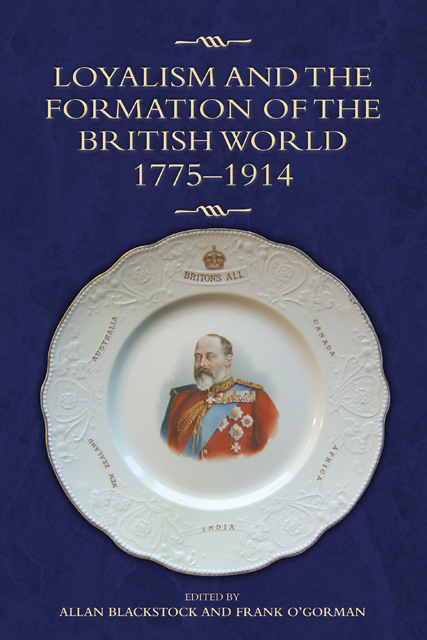Book contents
- Frontmatter
- Contents
- Notes on Contributors
- 1 Loyalism and the British World: Overviews, Themes and Linkages
- 2 Origins and Trajectories of Loyalism in England, 1580–1840
- 3 The ‘Spirit of Loyalty’: Material Culture, Space and the Construction of an English Loyalist Memory, 1790–1840
- 4 Anti-Catholicism and Orange Loyalism in Nineteenth-Century Britain
- 5 Loyalty and the Monarchy in Ireland, c.1660–c.1840
- 6 The Trajectories of Loyalty and Loyalism in Ireland, 1793–1849
- 7 Presbyterians, Loyalty and Orangeism in Nineteenth-Century Ulster
- 8 Unionists and Patriots: James Whiteside, the Irish Bar and the Dilemmas of the Protestant Nation in Victorian Ireland
- 9 Loyalism in British North America in the Age of Revolution, c.1775–1812
- 10 ‘A Colonial Hybrid’: Nineteenth-Century Loyalism as Articulated by the Orange Order in the Maritime Colonies of British North America
- 11 Canadian Catholics, Loyalty, and the British Empire, 1763–1901
- 12 Loyalism in Australasia, 1788–1868
- 13 ‘We love one country, one queen, one flag’: Loyalism in Early Colonial New Zealand, 1840–80
- 14 Clientelism, Community and Collaboration: Loyalism in Nineteenth-Century Colonial India
- Select bibliography
- Index
14 - Clientelism, Community and Collaboration: Loyalism in Nineteenth-Century Colonial India
Published online by Cambridge University Press: 28 February 2023
- Frontmatter
- Contents
- Notes on Contributors
- 1 Loyalism and the British World: Overviews, Themes and Linkages
- 2 Origins and Trajectories of Loyalism in England, 1580–1840
- 3 The ‘Spirit of Loyalty’: Material Culture, Space and the Construction of an English Loyalist Memory, 1790–1840
- 4 Anti-Catholicism and Orange Loyalism in Nineteenth-Century Britain
- 5 Loyalty and the Monarchy in Ireland, c.1660–c.1840
- 6 The Trajectories of Loyalty and Loyalism in Ireland, 1793–1849
- 7 Presbyterians, Loyalty and Orangeism in Nineteenth-Century Ulster
- 8 Unionists and Patriots: James Whiteside, the Irish Bar and the Dilemmas of the Protestant Nation in Victorian Ireland
- 9 Loyalism in British North America in the Age of Revolution, c.1775–1812
- 10 ‘A Colonial Hybrid’: Nineteenth-Century Loyalism as Articulated by the Orange Order in the Maritime Colonies of British North America
- 11 Canadian Catholics, Loyalty, and the British Empire, 1763–1901
- 12 Loyalism in Australasia, 1788–1868
- 13 ‘We love one country, one queen, one flag’: Loyalism in Early Colonial New Zealand, 1840–80
- 14 Clientelism, Community and Collaboration: Loyalism in Nineteenth-Century Colonial India
- Select bibliography
- Index
Summary
Introduction
Our existence in South Africa is only in our capacity as British subjects. In every memorial we have presented, we have presented our rights as such. We have been proud of our British citizenship, or have given our rulers and the world to believe that we are so proud.
Mohandas Karamchand Gandhi’s words of 1899 were presented while working as an advocate for the rights of Indians in South Africa, and argued for Indian support to, and loyalty towards, Britain at the start of the Boer War. Gandhi went on to develop what became one of the most radical and successful forms of anti-colonial protest from the time of the First World War. His early loyalism to the principles of imperial justice established by British power in India, though, largely remained as an integral part of the logic underpinning his method of protest – satyagraha. These movements were based on the idea that the colonial state could be exposed for not fulfilling its own principles of justice, political, constitutional and civic rights. However, Gandhi’s attachment to these principles, even for a man with an international or imperial vision, were constantly mediated via networks of political interaction with business patrons, leaders of political parties, local urban and rural power-brokers and local/regional government officers. For Gandhi, as for a range of other political figures in nineteenth- and twentieth-century India, loyalty was a dynamic process of political response to the changing conditions of imperial governance. But perhaps most importantly, it was constantly mediated by a range of other loyalties and considerations, relating to community, forms of local governance and the dictates of political patronage.
To some extent, those working in government in Calcutta/Delhi or the provincial capitals realised that in order to promote loyalty, these networks had to be harnessed and exploited. Imperial historians from the 1960s, beginning with the work of Jack Gallagher and Ronald Robinson, and developing through what came to be known as the ‘Cambridge school’ of South Asian history, stressed the importance of ‘collaboration’ and clientelism in the operation, growth and survival of the colonial state in India. The structures of clientelism, for these historians, varied from region to region, but essentially followed a pattern in which the late colonial system co-opted powerful local interest groups as a means of governing, but also in response to political challenges.
- Type
- Chapter
- Information
- Loyalism and the Formation of the British World, 1775-1914 , pp. 263 - 286Publisher: Boydell & BrewerPrint publication year: 2014



